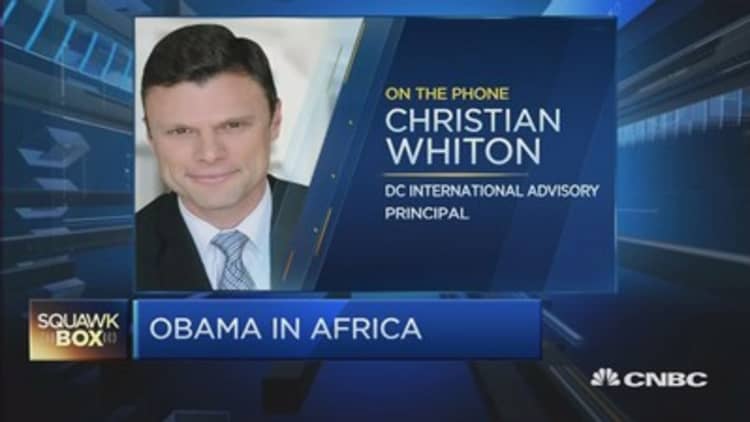When investors think of putting their money abroad, especially in conflict-ridden regions of the world, they have to factor big risks against possibly big returns. Nowhere is that more true than in Africa, and as , the continent is resurfacing as a hot topic in the investment community.
According to the Corporate Council on Africa, more than 180 multinational companies including Boeing, Caterpillar, Procter & Gamble, Wal-Mart, General Electric, Ford, Exxon Mobil, Chevron and IBM are looking to or have already made some play in Africa.
General Electric announced Thursday that it will put $14.7 million into a project in Nairobi, Kenya, to help develop the region's health-care technology sector.
Read MoreMarkets slammed by historic China selloff
That's just a small portion of the amount of money GE plans to invest in Africa through 2018. The conglomerate has invested about $1 billion in Nigeria—"$250 million in capital expenditures (CaPEX) and $800 million in operating expenses (Opex) by the next three years," according to a GE spokeswoman.
Wal-Mart acquired African grocery chain Massmart in 2011, and a Wal-Mart Africa spokesman said the group now operates 370 stories in South Africa and 38 in 12 other African countries.
If you are running e-commerce where there is no post office, it means the business will figure out the logistics. You need to run generators to power your computers, you need to provide security to your firm, and you certainly have to do everything, because the state can be practically invisible.Ndubuisi Ekekwefounder, African Institution of Technology
Corporate Council on Africa President and CEO Stephen Hayes told CNBC that while oil and natural resources still command the bulk of U.S. investment in Africa, he's starting to see more interest among investors in infrastructure development. And it's not just the multinational corporations that are trying to make a play for Africa.
Small- to medium-sized companies like New Jersey-based Acrow Bridge, which has about 200 employees, manufactures prefabricated modular steel bridges in Pennsylvania and then delivers them all around the world.
Read More Ebola: Out of the news but still hitting Africa
Paul Sullivan, vice president of international business development at Acrow, told CNBC that the company has put thousands of bridges in more than 20 countries in Africa. Acrow plans to deliver 144 bridges to Zambia and 55 to Cameroon by the end of this year.
He said the company sells bridges and arranges financing through various partners with Export-Import Bank guarantees, through something called a comprehensive bridge development program.
Sullivan declined to put a price tag on those bridges, but a press release on Ex-Im's website last year said that the bank would guarantee a $50 million loan to finance the export of 55 bridges: "The loan, extended by Société Générale to Cameroon's Ministry of Public Works, facilitates the export of modular steel bridges manufactured by the Acrow Corporation of America, a small business based in Parsippany, N.J," the release said.
'At least a decade or more away'
Certainly, Africa has inherent risks. Paul Schatz, president of investment management firm Heritage Capital, said he remains skeptical when it comes to investing in Africa, at least in the short term.
"While long term, I believe investing in Africa will provide China-like returns, I think that region is at least a decade or more away," Schatz told CNBC.
He said he wouldn't put his or clients' money in the region because of concerns including political instability, terrorism, a general lack of government transparency and a lack of liquid capital.

Ndubuisi Ekekwe, founder of the African Institution of Technology, a nonprofit that works to bring emerging technology into Africa from the U.S. and Western Europe, described some of the main challenges when it comes to working in the region.
"For example, if you are running e-commerce where there is no post office, it means the business will figure out the logistics. You need to run generators to power your computers, you need to provide security to your firm and you certainly have to do everything, because the state can be practically invisible," Ekekwe said. "It takes tenacity and commitment to operate in Africa."
Despite the "typical business risk," however, Ekekwe said that Africa is democratizing and could provide a keen growth opportunity for businesses.
Read MoreDid the fall of the Berlin Wall help end Apartheid?
"The fact is this, if you pay attention, it is even simpler to do business than in the U.S. because in most cases there is no regulation," he said. "There are things oil firms do in Africa that cannot be done in Texas."
Jon Gosier has been working in Africa since 2008, when he started a tech consultancy firm called Appfrica. Separately, he started an early stage technology fund called Cross Valley Capital, which reserves 5 percent of investments for Africa.
Though he described his experience working in Africa as "exceptional," he told CNBC that "the challenge in Africa is lack of exits and M&A activity, so you have to get creative with how you earn returns."
"This, in my opinion, is why the African private markets are so nascent, and until there's more companies being bought, investors will stay away because they fear not being able to get returns," Gosier said. "We get around this risk through revenue share and licensing deals with our African portfolio."


